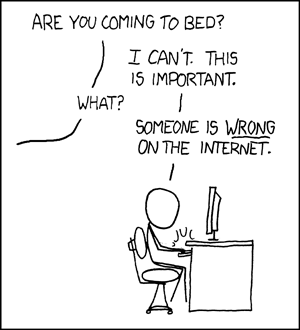I think "promoting the general welfare"
Is a very specific in the wording and intent to better American society. Which since the end of the Dark Ages, has meant an educated society.
...except that the US Constitution provides a much better framework than the previous Articles of Confederation did. Additionally, if "promoting the general welfare" is an operable section instead of just an introduction, than it basically completely removes the 10th Amendment from any sort of usefulness. After all, what powers are not delegated to the Federal Government?
As an alternative, is not a general welfare also provided by protecting local control through the individual states?
Unless of course you consider China, Pakistan, and India's society as the ideal America.
No, but on the same token I don't view UK, France, Germany, etc as an ideal America either. States and nations (used in the international sense) are different, and the government that they build for themselves are going to be different.
I know there is an argument that no powers are specifically delegated to anyone in the preamble, and I am not willing to argue they are.
...however you can't just declare victory and argue that powers are granted because it supports your side.
However, considering that it is actually part of the constitution, and both the declaration of independance and the Bill of Rights, both seperate documents, are considered "part" of the founding documents and law the US is based on by many constitutional experts, I am not sure how a statement (the preamble) clarifying intent, is not convincing or authoritative enough.
Actually, the Bill of Rights is the first 10 amendments of the US Constitution. ...and yes, the Declaration of Independence doesn't hold any power when it comes to deciding which power is delegated to which state, or consequently reserved to the States or the People.
Afterall,
"We hold these truths to be self-evident, that all men are created equal, that they are endowed by their Creator with certain unalienable Rights, that among these are Life, Liberty and the pursuit of Happiness"
is not written in the constitution.
As I also recall, it was some years before the Bill of rights was proposed and ratified as amendments to the constitution. Are we to say that Americans did not have such rights until such time?
I think not.
Yes, that section is a part of the Declaration of Independence. No, that section does not provide any powers at all. Arguably that can also be achieved at the state level.
No, however the Bill of Rights did not add any power to the Federal Government. Additionally, there were strong arguments at the time that it was seen as both useless and counterproductive. Those rights were there regardless of if they were enumerated, and by enumerating some rights, we become at risk for people arguing that those are the only rights protected by the Constitution. Additionally, they just successfully fought a rebellion and were under the impression that the government wouldn't forget why that rebellion was fought.
They were wrong about the need for a Bill of Rights, thankfully. Unfortunately, they were correct that people would misinterpret enumerating some rights for enumerating all rights.
Additionally, notice that the Bill of Rights protects the individual. No where does it create a duty towards someone else. It simply limits the Federal Government (and not even the state governments at that time), no more, no less.
Since we know it is possible to create amendments to repeal earlier ones, what do you think the consequences of say ratifying an amendment limiting the right to bear arms or unlimited search and seizure without a warrent would be?
Since these are technically amendments, repealing them wouldn't be unconstitutional.
It's possible. I extremely doubt that it would even get out of committee, little less passed through. The bar is extremely high for amendments. Additionally, I don't think it's easy to compare the repeal of Prohibition (the only amendment that tries to legislate through amendment instead of adjusting enumerated rights or how the government functions) to an amendment enumerating an individual right.




